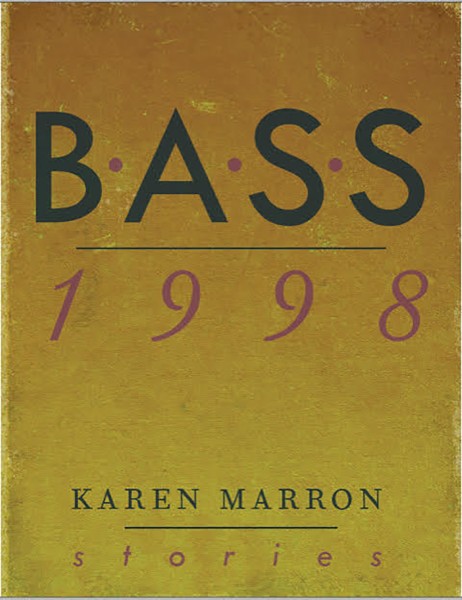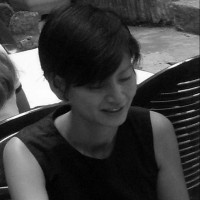
Reviewed by Sabine Huynh
The Best American Short Stories yearly anthology has been published since 1915, and Karen Marron read and reread the 1998 installment for twenty years, allowing it to decant, until the stories’ ghosts invited themselves into her life, and their pounding heartbeats married the pulse of her own writing. Then she started writing back. That in itself is already a great lesson in writing: read first, read again, never stop rereading, for there is always something for you between the lines, if not now, then a few years down the road, once you are open enough to perceive it.
Laying the foundation for any good story can indeed take as long as a decade or two, and the base of Karen Marron’s brilliant flash fiction collection is solid: the reference point is thus The Best American Short Stories 1998, which provides Marron’s book with its name, B.A.S.S. 1998 (Gold Line Press, 2020), as well as the rhythm to its tightly woven stories, their bass note. Each one of Marron’s stories bears the title of the 1998 story it is rooted in, and opens with a haunting quote giving the lowest sounding pitch of the new story. That is very daring, resulting in Marron’s stories measuring up to the elders’, and passing the test with flying colours. Not only does B.A.S.S. 1998 have a strong and steady pulse, but each story separately also has its own strength independently while admirably working together with the others as a whole. As a matter of fact, Marron, by submitting to the constraint of writing from and within the stories written by others, has found the form in which to express the existential questions ruminated by her characters. Quoting one’s elders (Annie Proulx, John Updike, Maxine Swann, to name but a few) is also a way to pay tribute to them, to thank them for what they have taught us, and to converse with them. Not to mention the fact that Marron’s book functions as a communicating vessel between her American culture and her adopted Israeli culture, leading the reader to contemplate the idiosyncrasies and perspectives of both.
B.A.S.S. 1998 can be read as the echo and the sounding board of the short story anthology published in 1998. Isn’t every literary text the transformation and combination by an author of different earlier texts? (see Julia Kristeva). “Every book grows on other books” (Julien Gracq). Marron’s book reminds us that literature is a bushy and wonderful forest in which the trees cling together and respond to each other, and under their canopy, one can’t but feel energized. Surely, after reading her book, you will want to read the motherbook, before going back to Marron’s intertextual feat again. The dialogic aspect of B.A.S.S. 1998 makes it an astonishing work of art, a skillful “choral” work that is a condensation of all the stories featured in The Best American Short Stories 1998, combined with her own memories and imagination. Moreover, Marron managed to do that in very few words, and her stories, kept under three pages for most, have come out as striking as they are brief, fierce and tender, like flashes of irony and empathy blend together, each story a lightning bolt that nails you in place. Indeed, she proves to be an acute observer of human behaviour and she seamlessly wove the voices of her American elders to the voice of a young female narrator living in Israel in the second millennium, a young soldier serving in the army and then a young mother, presumably herself at different times of her life, struggling to live in tune with the absurdity and contradictions of the world around her, especially in terms of bodily appearance and body language. Passages about dress style (for instance of young female Israeli soldiers, or of Gilad Shalit after his release) are both puzzling and hilarious.
The twenty-one compressed stories are mostly told in the first person, singular or plural, in relation to another person, “you,” or “they,” and sometimes the narrator also tackles “it,” such as: what is hidden in language, or some kind of looming threat, or the actual powerlessness of what we think as being destructive because we’ve been brainwashed… The bass tone of these stories is grave and dark, painful, like a throbbing headache: unanswerable questions around child molestation, motherhood, fame, faith, violence, rape, deceit, disenchantment, loneliness, illness, death… But the reader won’t be discouraged by all this, because in addition to confronting difficult subjects, Karen Marron’s sharp book is also very funny at times, and her wit is one of the perks that enlighten the collection.
One of my favourite stories, “The Half-Skinned Steer,” based on Annie Proulx’s eponymous story published in 1998, asks what is language (a tongue) after it has been eaten by the family dog. Another favourite, “The Blue Devils of Blue River Avenue,” based on Poe Ballantine’s story, also addresses language, and the way it can deceive: “So it is a lie, then, the pink stroganoff.” Marron’s flash fiction deals a lot with confusion, differences, and fine-drawn lines, between telling stories and writing good ones, between writing and interpretation, between appearances, times, emotions, standards of taste, and between what’s real and imagined, the sane and the insane.
All in all, B.A.S.S. 1998 by Karen Marron is an intimate, subtle and exhilarating textual palimpsest that offers a deep reflection on, and an excellent example of, what creating a continuum means, and particularly in the context of creative writing.
________________________________
 Sabine Huynh is a poet, translator and editor based in Tel Aviv. She holds a PhD in Linguistics from the Hebrew University of Jerusalem and is the author of a dozen books (poetry, novel, short stories, essay, diary), and numerous translations (from the French, Hebrew and English). Her poetry collections include Kvar lo, which won France’s 2017 CoPo Poetry Prize, and Dans le tournant/Into the Turning, a bilingual English-French book co-authored with Amy Hollowell. Her first novel, La Mer et l’enfant, was shortlisted for the 2014 Emmanuel-Roblès Prize and for the 2013 Chambery’s First Novel Festival Prize. With Haggai Linik, she is the founding editor of the French-Hebrew literary translation magazine Peham. Her French translation of the complete poetry of Anne Sexton is due out in 2021 with the feminist publishing house Editions des Femmes.
Sabine Huynh is a poet, translator and editor based in Tel Aviv. She holds a PhD in Linguistics from the Hebrew University of Jerusalem and is the author of a dozen books (poetry, novel, short stories, essay, diary), and numerous translations (from the French, Hebrew and English). Her poetry collections include Kvar lo, which won France’s 2017 CoPo Poetry Prize, and Dans le tournant/Into the Turning, a bilingual English-French book co-authored with Amy Hollowell. Her first novel, La Mer et l’enfant, was shortlisted for the 2014 Emmanuel-Roblès Prize and for the 2013 Chambery’s First Novel Festival Prize. With Haggai Linik, she is the founding editor of the French-Hebrew literary translation magazine Peham. Her French translation of the complete poetry of Anne Sexton is due out in 2021 with the feminist publishing house Editions des Femmes.

 Included in the price of SmokeLong Fitness:
Included in the price of SmokeLong Fitness: